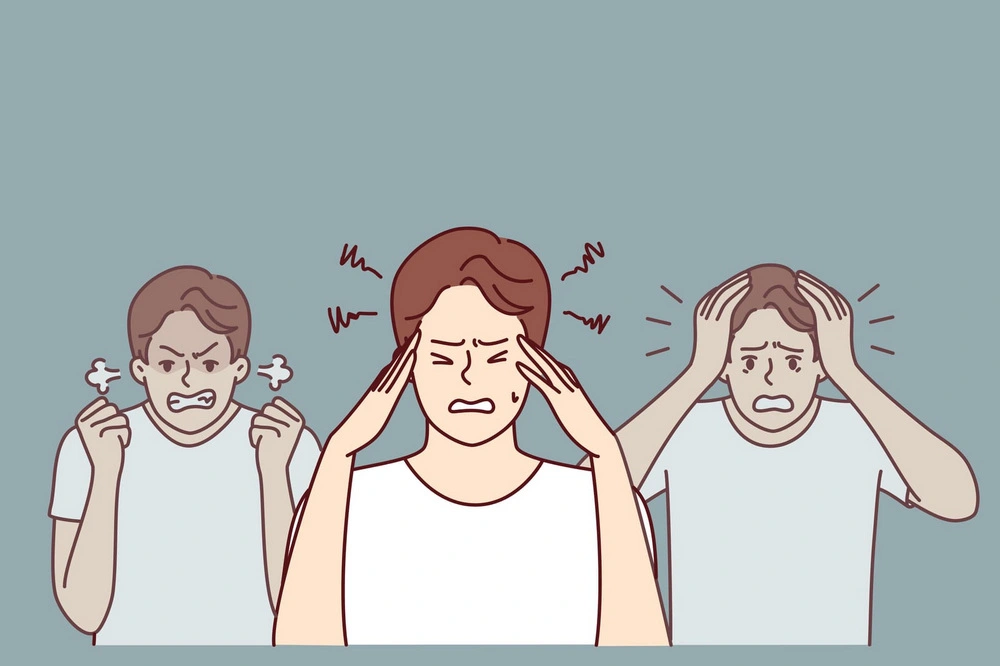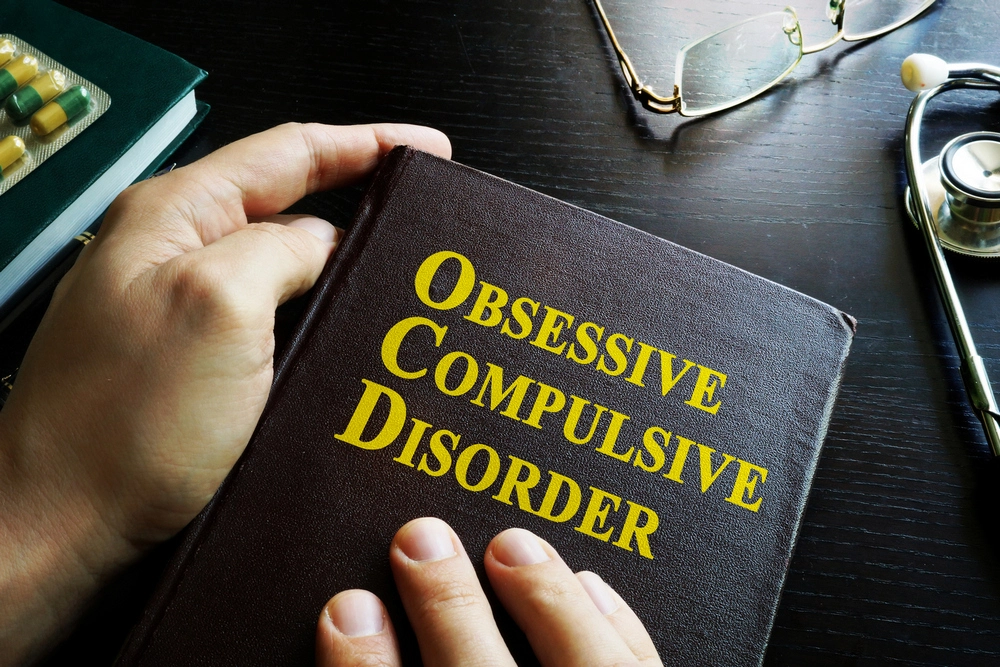Obsessive-compulsive disorder is characterized by obsessions and/or compulsions. Obsessions are persistent thoughts or images that intrude upon someone’s mind even if they don’t want them, but compulsions are repetitive behaviors that they do in response to those obsessions to try and control them or feel better about them.
Paranoia is an unrealistic set of viewpoints, usually distrust of others. It’s important to understand the connection between OCD and paranoia so that you can recognize symptoms and get the right treatment. This article will inform and guide individuals on symptoms, causes, and treatments for both.
Understanding OCD and Paranoia

Obsessive-compulsive disorder represents its own category of related obsessive disorders in the DSM. It is diagnosed with the presence of obsessions, compulsions, or both. Obsessions and compulsions are time-consuming and cause significant distress.
Paranoia is an irrational, intense, and persistent thought of things that are fearful or anxiety-inducing. This usually involves distrust or suspicion without any real reason, and it is not generally its own condition but rather something related to other mental health conditions like OCD.
Symptoms of OCD and Paranoia
The symptoms of OCD are as follows:
- Obsessions refer to recurrent and persistent thoughts and attempts to ignore or suppress those thoughts with some sort of action. That action refers to the compulsions.
- Compulsions are repetitive behaviors or mental acts that are done to prevent or reduce anxiety related to events or unwanted images, and they can include washing, organizing, checking things, counting things, or praying.
The symptoms of paranoia include:
- A mental state of feeling threatened, fearful, or distrustful, particularly of other people, without any supporting evidence.
- Social isolation and hostility toward others or being easily offended by others.
Can OCD Cause Paranoia?
Paranoia OCD symptoms are interrelated when you understand the mechanism behind obsessive-compulsive disorder.
How obsessive thoughts can lead to paranoid thinking
The reason that there is a relationship between OCD and paranoia is that OCD is an anxiety-based disorder, even though it is categorized as its own group. Since it is grounded in anxiety that can contribute to legitimate fears, and when individuals are exposed to those fears, it can cause significant rumination and concern that eventually leads to paranoia.
Progression
Let’s look at the progression of OCD and paranoia in a bit more detail.

Leah struggles with obsessive-compulsive disorder. She has a significant fear of germs from shared surfaces or workspaces, so she goes out of her way to keep her house clean and avoid social contact with other people who might expose her to germs.
Leah trusts a few friends and family members who are clean and orderly and understand her condition, so she can be around them in their homes without too much trouble.
However, Leah has a lot of anxiety about being exposed to germs at social events, particularly church and work-related functions. This contributes to legitimate fear, and whenever there’s an upcoming event that she cannot get out of, Leah’s OCD-induced rumination makes it difficult for her to take her thoughts away from anything other than the upcoming event and the possibility of germ exposure.
As the holidays approach, Leah is very stressed with some of her upcoming business travel and projects. She is trying to manage several projects without the appropriate support and she is finding it difficult to focus because she knows that there is an upcoming business event where she is required to attend.
The event itself will have her as a keynote speaker for her branch, after which there is a small cocktail party. Leah is becoming more stressed each week, obsessing about the potential germ exposure particularly for the podium where she will not be the only one touching the podium and microphone, and for the cocktail party after.
Over the next few weeks, Leah starts to experience paranoia as a result of this increase in her OCD-induced rumination, anxiety, and stress. She is paranoid about the people around her, constantly fearful that they are covered in germs and trying to infect her.
Causes and Risk Factors
As demonstrated in the case of Leah, paranoia OCD symptoms tend to happen in a subgroup of people with OCD who are under specific stress, and it doesn’t happen overnight. Can OCD cause paranoia in everyone? In theory, it can, but it usually only happens when individuals have a legitimate fear and know that they will be exposed to the source of their anxiety and have a lot of stress before that particular exposure.
Diagnosing OCD and Paranoia
If you are struggling with any of these symptoms, it’s important that you get an accurate diagnosis. An accurate diagnosis of paranoia and OCD will come from a qualified psychiatrist.
When you meet with a psychiatrist, they will review the diagnostic criteria for OCD, which includes the obsessions and compulsions listed above, as well as the symptoms of paranoia. You will be asked a series of questions during your assessment that have to do with the extent to which things like obsessions, compulsions, and fears interfere with your daily life and whether or not they might be better explained by another existing mental health condition or physical health condition.
Mental health professionals will utilize the criteria listed in the DSM-5 as their main assessment tool but they’ll also use methods that involve asking you a series of questions about your physical and mental health as well as daily activities, thoughts, and more.
Comorbid conditions are one aspect of the assessment that a qualified psychiatrist will review. Comorbid means that you have more than one condition existing at the same time. OCD has a set list of specific comorbidities that are most common, and one of them is paranoia.
During your assessment and diagnosis, a mental health professional will look for information about any comorbid conditions and, if they suspect it, diagnose paranoia and OCD.
Why does this matter? Having an accurate diagnosis that includes comorbid conditions is essential to getting the right type of treatment. If you have more than one condition and you only diagnose one of those two conditions, you’ll only get subsequent treatment for one of those two which means that the symptoms of the second condition can still present.
Treatment Options for OCD and Paranoia
Treatment options for OCD and paranoia center on lifestyle changes and therapy. One of the most common treatments for OCD and paranoia has to do with controlling the anxiety that serves as the foundation for paranoia symptoms.
Cognitive behavioral therapy is one of the most common forms of treatment. Cognitive behavioral therapy offers an opportunity to change your automatic negative thoughts and to learn coping mechanisms that help you control your obsessions and compulsions.
You can also learn lifestyle skills and healthy coping mechanisms from support groups and holistic therapy that centers on stress reduction. If you consider the example of Leah above, stress reduction techniques and support groups will go a long way toward helping her reduce the stress she experiences in the weeks leading up to the development of her paranoia.
In some cases, medications might be prescribed, like anxiety medications or antidepressants, to help with specific symptoms.
Preventing Relapse and Maintaining Progress
Preventing relapse and maintaining progress comes down to maintaining the stress level in your life and controlling your response to the anxiety or fears that serve as the foundation for the subsequent development of your paranoia.
This type of achievement is best done with the support of a professional therapist and an individualized treatment plan.
Summing up
Can OCD cause paranoia? Yes, it can. There is a strong relationship between OCD and paranoia, particularly in subtypes of OCD for those individuals who experience high stress. At its core, this is related to severe fears and anxiety and the potential risk of exposure to those fears.
However, there are several treatment options for those who are dealing with OCD and paranoia. When you seek professional help, you can get a correct diagnosis and subsequent treatment to help prevent relapse and maintain your progress.



